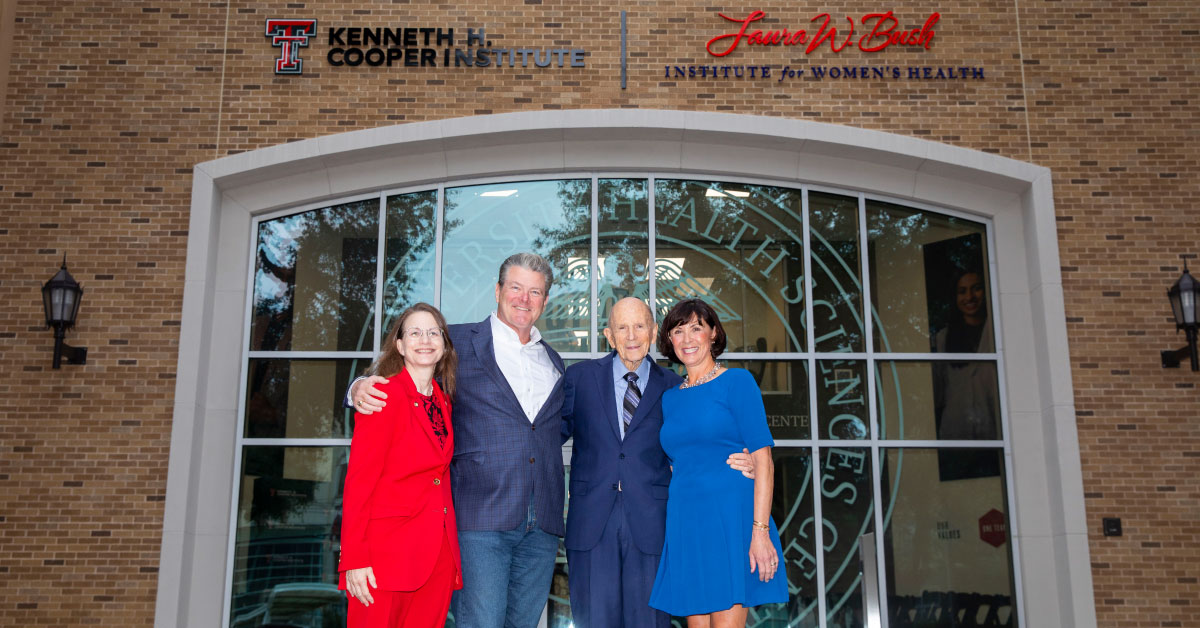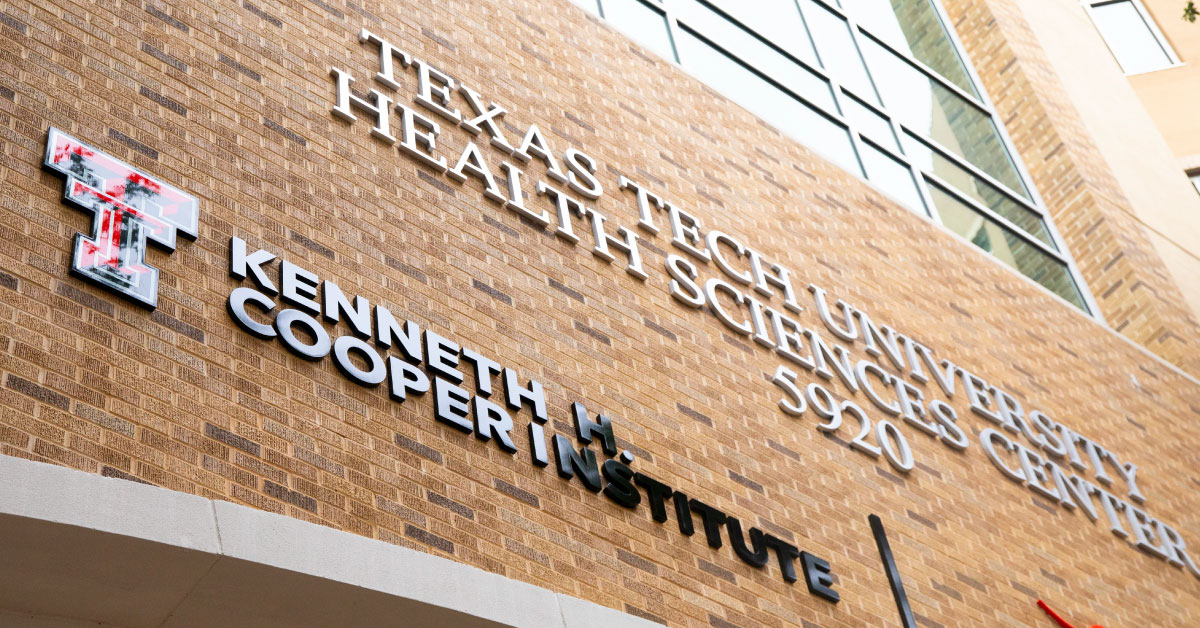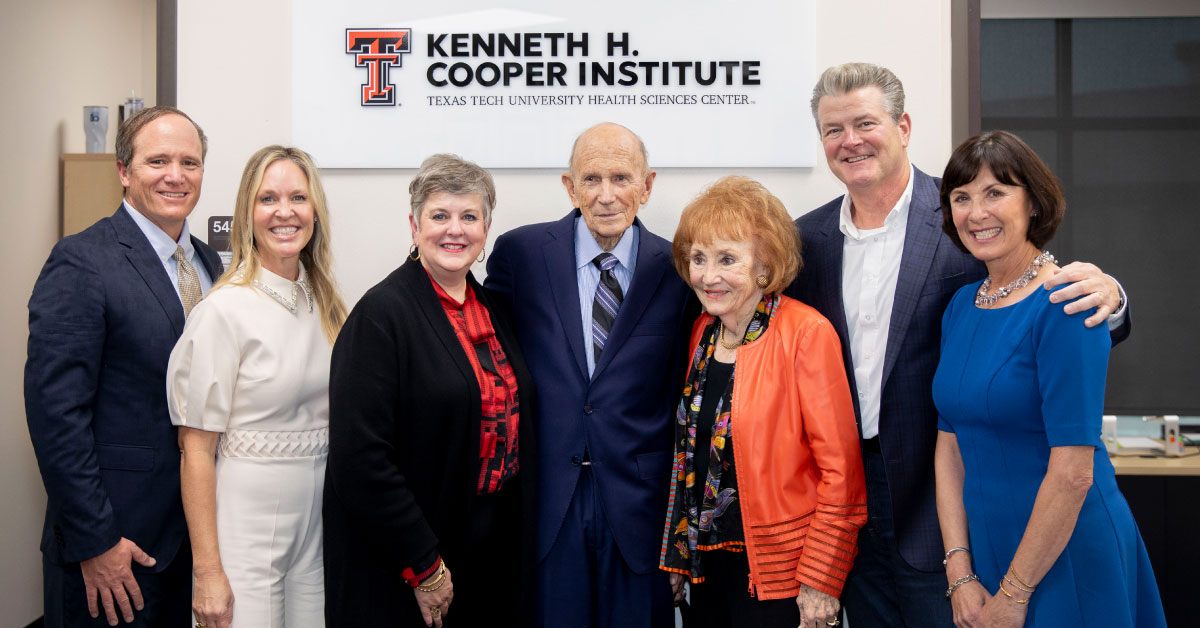The Kenneth H. Cooper Institute at Texas Tech University Health Sciences Center Unveiled in Dallas
 For more than 50 years, as a leading pioneer of preventive medicine and the “father
of aerobics,” Kenneth H. Cooper, M.D., has revolutionized health and fitness worldwide.
Similarly, the Texas Tech University Health Sciences Center (TTUHSC) has long been dedicated to education, patient care and research. Today (Nov.
4) TTUHSC officially welcomed The Cooper Institute as part of its organization with
a special presentation and unveiling of its new name – the Kenneth H. Cooper Institute
at Texas Tech University Health Sciences Center.
For more than 50 years, as a leading pioneer of preventive medicine and the “father
of aerobics,” Kenneth H. Cooper, M.D., has revolutionized health and fitness worldwide.
Similarly, the Texas Tech University Health Sciences Center (TTUHSC) has long been dedicated to education, patient care and research. Today (Nov.
4) TTUHSC officially welcomed The Cooper Institute as part of its organization with
a special presentation and unveiling of its new name – the Kenneth H. Cooper Institute
at Texas Tech University Health Sciences Center.
The Cooper Institute, the nonprofit partner of Cooper Aerobics, focuses on research and education to promote preventive medicine across all stages of life. The Cooper Clinic, also under the Cooper Aerobics brand, will remain a separate entity.
“The Cooper Institute has provided groundbreaking research in epidemiology, exercise physiology, behavior change, obesity, healthy aging and other health issues,” TTUHSC President Lori Rice-Spearman, Ph.D., said. “Adding them to our team offers incredible opportunities to enhance research and impact public health and marks a significant milestone for our university.”
Six months before opening the Cooper Clinic in 1970, Cooper founded The Cooper Institute to collect preventive medicine data. What began as consented patient data stored in a shoebox has since become the world’s largest study on measured fitness.
The world-renowned Cooper Center Longitudinal Study provides the opportunity to evaluate healthy people and how healthy behaviors and preventive medicine affect individuals. Throughout 50 years, The Cooper Institute has proven:
- Being more fit is associated with lower cardiovascular disease
- Increasing fitness decreases the risk of dying from all causes by 58%
- Higher fitness levels significantly lower the risk of dementia later in life
- Importance of fitness as a means to reduce mortality risk in today’s era
 The Cooper Institute’s research was instrumental in identifying physical inactivity
as an important public health problem and setting public health recommendations for
physical activity with initiatives from the American Heart Association, American College
of Sports Medicine and Centers for Disease Control and Prevention.
The Cooper Institute’s research was instrumental in identifying physical inactivity
as an important public health problem and setting public health recommendations for
physical activity with initiatives from the American Heart Association, American College
of Sports Medicine and Centers for Disease Control and Prevention.
“After many years of searching, I’m thrilled that The Cooper Institute, which I founded in 1970 based on scientific data from Cooper Clinic, is now a part of the Texas Tech University Health Sciences Center,” Cooper Aerobics founder and chairman Kenneth H. Cooper, M.D., said. “With the university’s presence in Dallas, I have the peace of mind of knowing the important work I’ve devoted my life to will continue. We will collaborate to continue our research and hopefully establish a preventive medicine residency program. With increased awareness we are now seeing in the field of preventive medicine, I am sure that the need will far outweigh the availability of physicians being trained in this area, and I’m glad to be helping to solve that imbalance.”
Texas Tech University System Chancellor Tedd L. Mitchell, M.D., who previously served as medical director, president and chief executive officer of the Cooper Clinic, recognizes the institute’s pivotal role in shifting the field of medicine from disease treatment to prevention.
 “Through his pioneering research and transformative life’s work, Dr. Cooper fundamentally
changed what we know and how we think about exercise and fitness,” Mitchell said.
“Having the Kenneth H. Cooper Institute at TTUHSC is incredibly special to me, personally
and professionally, and will be a vital asset as we continue to educate and train
our students and serve the people of Texas and beyond. I am honored to call him a
mentor and dear friend, and we are humbled that The Cooper Institute has entrusted
our institution to continue and build upon this remarkable, life-saving legacy.”
“Through his pioneering research and transformative life’s work, Dr. Cooper fundamentally
changed what we know and how we think about exercise and fitness,” Mitchell said.
“Having the Kenneth H. Cooper Institute at TTUHSC is incredibly special to me, personally
and professionally, and will be a vital asset as we continue to educate and train
our students and serve the people of Texas and beyond. I am honored to call him a
mentor and dear friend, and we are humbled that The Cooper Institute has entrusted
our institution to continue and build upon this remarkable, life-saving legacy.”
Laura DeFina, M.D., will continue to lead the institute as the executive director. She has served as the president and CEO of The Cooper Institute since 2014 and previously as its medical director and chief science officer. She and 12 institute members will be located at TTUHSC Dallas. Several team members will have faculty appointments in the TTUHSC Julia Jones Matthews School of Population and Public Health.
“The Kenneth H. Cooper Institute at TTUHSC’s leadership, expertise and dedication to advancing preventive medicine will undoubtedly enhance our efforts to expand access to health care and make a lasting, positive impact on the communities we serve,” Rice-Spearman said.
Related Stories
National Academy of Inventors Names TTUHSC Faculty Senior Members
The National Academy of Inventors (NAI) has designated two current and one former TTUHSC faculty researchers as Senior Members.
TTUHSC Cancer Researcher Honored by National Academy of Inventors
C. Patrick Reynolds, M.D., Ph.D., director of the School of Medicine Pediatric Cancer Research Center at TTUHSC, has dedicated his life as a researcher to developing treatments for childhood cancers.
TTUHSC’s Hudson Set to Serve as President for Society of Clinical Research Associates
The Society of Clinical Research Associates (SOCRA) has elected Texas Tech University Health Sciences Center’s (TTUHSC) Catherine Hudson, Dr.P.H., as its president for 2025-2026.
Recent Stories
The John Wayne Cancer Foundation Surgical Oncology Fellowship Program at Texas Tech University Health Sciences Center Announced
TTUHSC is collaborating with the John Wayne Cancer Foundation and has established the Big Cure Endowment, which supports the university’s efforts to reduce cancer incidence and increase survivability of people in rural and underserved areas.
TTUHSC Receives $1 Million Gift from Amarillo National Bank to Expand and Enhance Pediatric Care in the Panhandle
TTUHSC School of Medicine leaders accepted a $1 million philanthropic gift from Amarillo National Bank on Tuesday (Feb. 10), marking a transformational investment in pediatric care for the Texas Panhandle.
Texas Tech University Health Sciences Center Permian Basin Announces Pediatric Residency Program Gift
TTUHSC Permian Basin, along with the Permian Strategic Partnership and the Scharbauer Foundation, Feb. 5 announced a gift that will fund a new pediatric residency.
